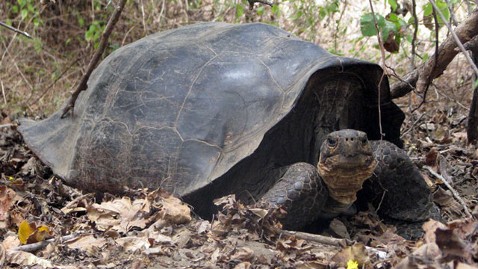'Extinct' Galapagos Tortoise Turns Up on Distant Island

A giant Galapagos tortoise, Chelonoidis elephantopus, found on Isabela Island in the Galapagos island chain. Courtesy Yale University
A type of giant tortoise, observed in the Galapagos Islands in 1853 by Charles Darwin but thought to have been extinct for 150 years, is apparently alive and well. This news, from a team of biologists at Yale University, would be welcomed by conservationists, and it adds an ironic twist to Darwin's theory of evolution by natural selection.
The tortoise, known as Chelonoidis elephantopus, originally lived on Floreana, one of the islands in the Galapagos chain. Biologists believed that by the mid-1800s, they had been wiped out by whalers, who hunted them for food.
But Gisella Caccone and Ryan Garrick of Yale organized a team that took DNA samples from the blood of 1,600 tortoises on Isabela Island, 200 miles away - and the genetic makeup of at least 84 of them was such that they had to have at least one parent who was a member of C. elephantopus. Their genes were significantly different from what was found in other tortoises on the island. From that the scientists could extrapolate, and estimate that at least 38 tortoises would turn out to be purebred members of the species. It's complicated, but the bottom line, they said, is that an extinct species…isn't.
"At first, we didn't know where these tortoises had come from. We called them aliens," said Caccone in a telephone interview. They compared the DNA to samples from the 19th century in American museums. "When we did the analysis, we said, uh, oh, those 'aliens' were from what we thought was the extinct population."
The tortoises have a place in the history of evolution. Darwin famously observed that there were variations in animals from island to island, best explained if they had evolved to survive the particular conditions on each.
So how did the tortoises - unlikely to swim 200 miles en masse - wind up on the wrong island? The scientists' best guess is that whalers, hauling them on board when they stopped at Floreana to find food, threw some overboard near Isabela. Over the years they are believed to have taken hundreds of thousands of the animals.
Now, said Caccone, there is the possibility of returning C. elephantopus to its native island. But scientists will want to discuss that very carefully.
The researchers have now published their findings in the journal Current Biology. What is it like to make such a discovery?
"It's fun. It's a lot of fun," said Caccone. "It's like being an investigative reporter, or someone from 'CSI Galapagos.'"